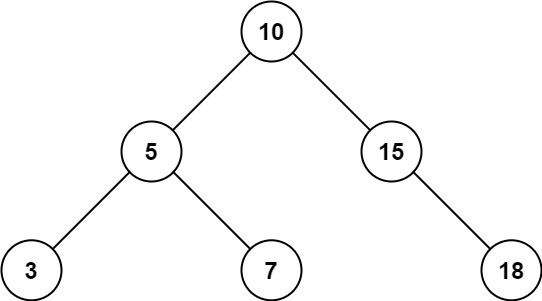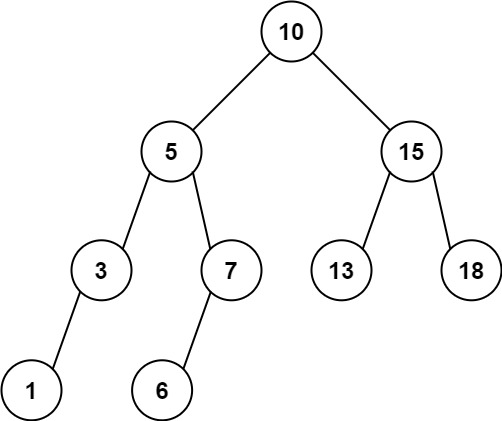Given the root node of a binary search tree and two integers low and high, return the sum of values of all nodes with a value in the inclusive range [low, high].
Example 1:
Input: root = [10,5,15,3,7,null,18], low = 7, high = 15 Output: 32 Explanation: Nodes 7, 10, and 15 are in the range [7, 15]. 7 + 10 + 15 = 32.
Example 2:
Input: root = [10,5,15,3,7,13,18,1,null,6], low = 6, high = 10 Output: 23 Explanation: Nodes 6, 7, and 10 are in the range [6, 10]. 6 + 7 + 10 = 23.
Constraints:
- The number of nodes in the tree is in the range
[1, 2 * 104]. 1 <= Node.val <= 1051 <= low <= high <= 105- All
Node.valare unique.
Companies:
Facebook, Amazon, Oracle
Related Topics:
Tree, Depth-First Search, Binary Search Tree, Binary Tree
// OJ: https://leetcode.com/problems/transpose-matrix/
// Author: github.com/lzl124631x
// Time: O(N)
// Space: O(H)
class Solution {
public:
int rangeSumBST(TreeNode* root, int L, int R) {
if (!root) return 0;
return (root->val >= L && root->val <= R ? root->val : 0) + rangeSumBST(root->left, L, R) + rangeSumBST(root->right, L, R);
}
};Or
// OJ: https://leetcode.com/problems/range-sum-of-bst/
// Author: github.com/lzl124631x
// Time: O(N)
// Space: O(H)
class Solution {
public:
int rangeSumBST(TreeNode* root, int low, int high) {
if (!root) return 0;
int sum = 0;
if (root->val >= low && root->val <= high) sum += root->val;
if (root->val < high) sum += rangeSumBST(root->right, low, high);
if (root->val > low) sum += rangeSumBST(root->left, low, high);
return sum;
}
};
